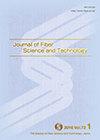Fabrication of Bio-Colored and Functional Wool Using Natural Pu’er Tea Extract
IF 0.3
4区 工程技术
Q4 MATERIALS SCIENCE, TEXTILES
引用次数: 0
Abstract
Applying synthetic dyes in textile dyeing may lead to severe environmental pollution due to liquid waste emissions; therefore, it is urgent to develop environmentally-friendly ecological dyes to minimize such damage. By using Pu’er tea extract (PTE) as a natural colorant to dye wool, this study created such bio-colored material in experiments, during which the thermal stability and antibacterial activity of wool both with and without PTE dyeing were also explored. Most importantly, it is proved that the dyed wool can deliver better color depth and fastness, with the dyeing ability considerably improved after ferrous sulfate (FeSO4·7H2O) mordant treatment as well. Furthermore, the inhibition rate of wool against Escherichia coli (E. coli) could reach 88.02 % and 90.25 % for direct dyeing and mordant dyeing, respectively, at a PTE concentration of 60 g/L, while the antibacterial rate remains above 70 % after 10 washing cycles of accelerated laundering. Another important phenomenon observed is that the thermal decomposition temperature of the wool dyed with PTE was increased, demonstrating that PTE, as a natural colorant, could improve the thermal stability of wool, in addition to stable dyeing properties.利用天然普洱茶提取物制备生物有色功能性羊毛
在纺织染色中使用合成染料会产生废液排放,严重污染环境;因此,开发环保型的生态染料,将这种危害降到最低是当务之急。本研究以普洱茶提取物(PTE)为天然着色剂对羊毛进行染色,通过实验制备了这种生物着色材料,并对PTE染色和未染色羊毛的热稳定性和抗菌活性进行了研究。最重要的是,经硫酸亚铁(FeSO4·7H2O)媒剂处理后的染色羊毛具有较好的色深和牢度,染色能力也有较大提高。PTE浓度为60 g/L时,直接染色和媒介染色对羊毛的抑菌率分别可达88.02%和90.25%,加速洗涤10次后抑菌率仍保持在70%以上。观察到的另一个重要现象是PTE染色羊毛的热分解温度升高,说明PTE作为一种天然着色剂,除了染色性能稳定外,还可以提高羊毛的热稳定性。
本文章由计算机程序翻译,如有差异,请以英文原文为准。
求助全文
约1分钟内获得全文
求助全文
来源期刊

Journal of Fiber Science and Technology
Materials Science-Materials Science (miscellaneous)
CiteScore
0.50
自引率
0.00%
发文量
17
 求助内容:
求助内容: 应助结果提醒方式:
应助结果提醒方式:


